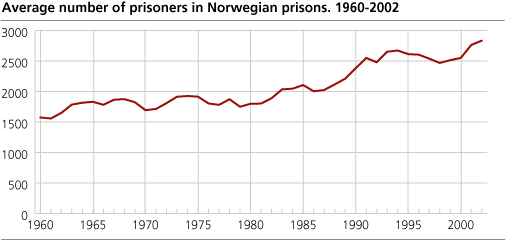Content
Published:
This is an archived release.
Prisoners spent longer time in custody
On an average the number of prisoners amounted to 2 800 in Norwegian prisons in 2002. This is a 2.5 per cent increase from the previous year. And use of custody increased the most.
There were 11 600 new imprisonments in 2002 - somewhat less than in the previous year. The proportion of women was 8 per cent. Relative to the population as a whole the age group 21-24 year had the highest number of new imprisonments.
At 1 January 2002, Norwegian prisons hosted more than 2 700 prisoners - almost 10 per cent more than 1 January 2001.
More prisoners in custody
Despite the 3 per cent decrease in the total number of new imprisonments, the number of new imprisonments in custody increased by almost 2 per cent from 2001, to almost 4 100. Amongst new imprisonments in custody, there were fewer women and more men than the year before. On an average day in 2002, there were almost 9 per cent more prisoners in custody compared to 2001.
In addition the prisoners spent a longer time in custody compared to 2001. 17 per cent of those discharged or transferred from custody to serving a sentence served for at least three months. Of those who completed custody sentences in 2002, 110 persons served more than one year.
Until all security detention sentences are completed, or reopened and reversed, both preventive detentions and security detentions will be included in the statistics on imprisonment. In 2002 new preventive detention sentences resulted in seven transfers from custody.
|
New special sanctions
The new special sanctions preventive detention, compulsory mental health care and compulsory care entered into force 1 January 2002 and was made retrospective so that security detention sentences can be reopened and reversed to one of the new special sanctions. The special sanctions replaced security detention as special penal measure, but there will still be persons serving sentences with warrant in security detention sanctions. |
Tables
Contact
-
Susanne Fjelldalen
E-mail: susanne.fjelldalen@ssb.no
tel.: (+47) 40 90 26 43
-
Kristin Bergvall
E-mail: kristin.bergvall@ssb.no
tel.: (+47) 92 66 55 13
-
Reid Jone Stene
E-mail: reid.jone.stene@ssb.no
tel.: (+47) 99 02 22 01

